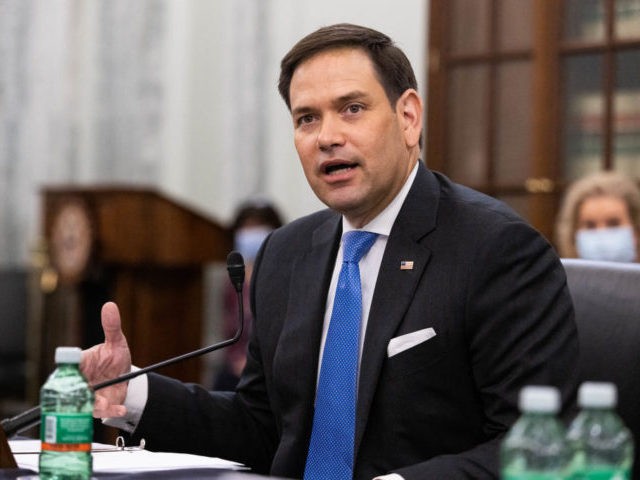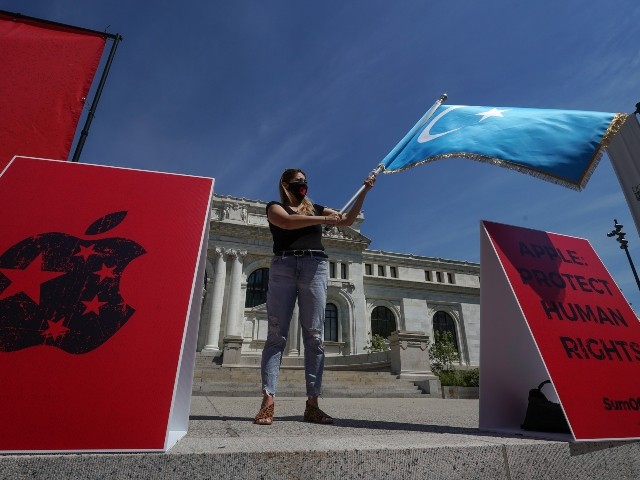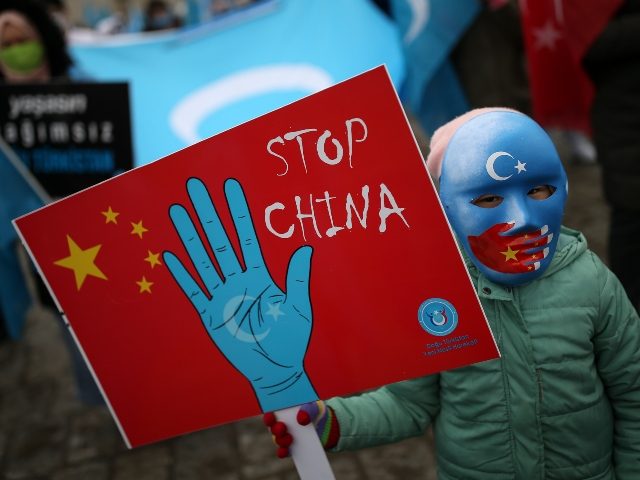The Senate on Thursday passed the Uyghur Forced Labor Prevention Act by unanimous consent, sending the bill to President Joe Biden’s desk for signature.
If signed, the bill will call out communist China for its genocidal actions against the Uyghur Muslims and tightly restrict imports from the Xinjiang region, where the Uyghurs are used for slave labor.
“It’s already illegal, by the way, to bring goods made with slave labor; it’s been that way since the 1930s. And yet it’s still happening, and we know it’s happening at an alarming, horrific rate with the genocide that we now witness being carried out by the Chinese government in the Xinjiang region,” Sen. Marco Rubio (R-FL), a sponsor and forceful proponent of the bill, said from the Senate floor on Thursday.
“The United States is so reliant on China that we have turned a blind eye to the slave labor that makes our clothes, our solar panels, and much more,” Rubio lamented when the House passed the Uyghur Forced Labor Prevention Act this week.
After the bill was approved by the Senate, Rubio said corporations would “no longer be able to continue to make Americans – every one of us, frankly – unwitting accomplices in the atrocities, in the genocide that’s being committed by the Chinese Communist Party.”

Photo by GRAEME JENNINGS/POOL/AFP via Getty Images
Co-sponsor Jeff Merkley (D-OR) said the new law will send “a resounding and unequivocal message against genocide and slave labor wherever these evils appear.”
“As the Chinese government tries to whitewash their genocide and claim a propaganda victory with the upcoming Olympics, this legislation sends a powerful, bipartisan message that the United States will not turn a blind eye,” Merkley said – a noble sentiment, but one that makes it harder to understand why any civilized nation would participate in the Beijing Olympics, which the United States will play in.
Thursday saw the third attempt to pass a version of the Uyghur Forced Labor Prevention Act. An effort to achieve unanimous consent on Wednesday was blocked by Sen. Ron Wyden (D-OR) when he attempted to attach an unrelated extension to child tax credits.
Rubio was able to attract necessary Democrat support for the third, ultimately successful, vote by lifting his hold on President Biden’s nominee for ambassador to China, Nicholas Burns. Burns was confirmed by a vote of 75-18 after the Uyghur act was passed. Two other Biden nominees were also confirmed to State Department posts.
NBC News reported on Thursday there was “offstage opposition from corporations with manufacturing links to China,” but “little to no overt opposition” to the bill. Nike, Coca-Cola, and Apple are among the companies that lobbied to water down the Uyghur Forced Labor Prevention Act when it was introduced in 2020, arguing its restrictions would severely compromise their supply chains.

WASHINGTON, DC – JULY 30: Activist Irade Kashgary waves a flag of the Uyghur region as she takes part in a protest outside of the Apple Store on K St. on July 30, 2020 in Washington, DC. The protest was organized to demand that Apple take action to protect Human rights. (Photo by Jemal Countess/Getty Images for SumOfUs)
Uyghur activists feared the Biden administration might oppose passage because it seeks cooperation from China on issues like climate change, but White House spokeswoman Jen Psaki indicated this week that President Biden supports the bill.
“We agree with Congress that action can and must be taken to hold the People’s Republic of China accountable for genocide and human rights abuses and to address forced labor in Xinjiang,” Psaki said.
The U.S. and other nations have imposed previous restrictions on products made with Uyghur forced labor, but the Uyghur Forced Labor Prevention Act is among the first blanket bans on Xinjiang products in the free world. The Act establishes a “rebuttable presumption” that nearly everything produced in Xinjiang was made with forced labor unless importers can demonstrate otherwise to the satisfaction of U.S. Customs and Border Protection.
Also on Thursday, the U.S. Commerce Department blacklisted a dozen Chinese biotechnology firms for their participation in mass surveillance against the Uyghurs.
“The scientific pursuit of biotechnology and medical innovation can save lives. Unfortunately, the PRC is choosing to use these technologies to pursue control over its people and its repression of members of ethnic and religious minority groups,” said Commerce Secretary Gina Raimondo.
“We cannot allow US commodities, technologies, and software that support medical science and biotechnical innovation to be diverted toward uses contrary to US national security,” Raimondo declared.

This photo taken on May 31, 2019 shows the outer wall of a complex which includes what is believed to be a re-education camp where mostly Muslim ethnic minorities are detained, on the outskirts of Hotan, in China’s northwestern Xinjiang region. – As many as one million ethnic Uighurs and other mostly Muslim minorities are believed to be held in a network of internment camps in Xinjiang, but China has not given any figures and describes the facilities as “vocational education centres” aimed at steering people away from extremism. (Photo by GREG BAKER/AFP via Getty Images)
The Chinese Communist government was, unsurprisingly, displeased by the passage of the Uyghur act and the Commerce Department blacklist.
“The U.S. has wantonly suppressed Chinese institutions and enterprises by overstretching the concept of national security and abusing export control measures under various excuses. It has reached a point of hysteria and would stop at nothing to do so,” railed Chinese Foreign Ministry spokesman Wang Wenbin on Thursday.
“What the U.S. did has seriously undermined the principles of market economy and international economic and trade rules, and harmed the interests of Chinese institutions and enterprises. China deplores and rejects this. The attempt of the U.S. to use Xinjiang to contain China will never succeed,” Wang said.

COMMENTS
Please let us know if you're having issues with commenting.